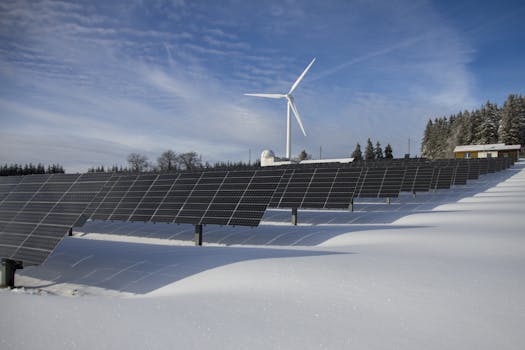Table of Contents
Powering the future with clean energy.
Introduction
Renewable energy is energy that is collected from resources that are naturally replenished on a human timescale, such as sunlight, wind, rain, tides, waves, and geothermal heat.How Geothermal Energy is Revolutionizing the Energy Industry
Renewable energy sources have become increasingly important in the fight against climate change and the transition to a more sustainable future. Among these sources, geothermal energy has emerged as a promising option that is revolutionizing the energy industry. Geothermal energy is derived from the heat stored beneath the Earth's surface. This heat is produced by the decay of radioactive elements and the heat leftover from the formation of the planet. Geothermal energy can be harnessed through various technologies, such as geothermal power plants, geothermal heat pumps, and direct use applications. One of the key advantages of geothermal energy is its reliability. Unlike solar and wind power, which are intermittent energy sources dependent on weather conditions, geothermal energy is available 24/7, making it a consistent and reliable source of power. This reliability makes geothermal energy an attractive option for meeting baseload energy demand and reducing the need for fossil fuels. In addition to its reliability, geothermal energy is also environmentally friendly. Geothermal power plants produce minimal greenhouse gas emissions and have a small footprint compared to traditional power plants. By tapping into the Earth's natural heat, geothermal energy helps reduce our reliance on fossil fuels and mitigate the impacts of climate change. Furthermore, geothermal energy is a sustainable resource that can be replenished over time. Unlike finite fossil fuels, geothermal energy is renewable and can be continuously tapped into without depleting its source. This makes geothermal energy a long-term solution for meeting our energy needs while reducing our carbon footprint. Another benefit of geothermal energy is its versatility. Geothermal power plants can be built in a variety of locations, from volcanic regions with high heat flow to areas with lower temperatures that can still be used for heating and cooling purposes. This flexibility allows geothermal energy to be deployed in a wide range of settings, making it a versatile and adaptable energy source. Geothermal energy is also cost-effective in the long run. While the upfront costs of building geothermal power plants and installing geothermal heat pumps can be high, the operational costs are relatively low compared to fossil fuel-based power plants. Over time, the savings from reduced fuel costs and maintenance expenses can offset the initial investment, making geothermal energy a cost-effective option for both electricity generation and heating and cooling applications. As the demand for clean and sustainable energy sources continues to grow, geothermal energy is poised to play a significant role in the energy transition. With its reliability, environmental benefits, sustainability, versatility, and cost-effectiveness, geothermal energy is revolutionizing the energy industry and helping to pave the way towards a greener future. In conclusion, geothermal energy is a valuable resource that is reshaping the energy landscape and offering a sustainable alternative to fossil fuels. By harnessing the Earth's natural heat, geothermal energy is providing a reliable, environmentally friendly, and cost-effective solution for meeting our energy needs. As we strive to reduce our carbon footprint and combat climate change, geothermal energy stands out as a promising option that is revolutionizing the energy industry and driving us towards a more sustainable future.The Future of Wind Power: Innovations and Developments

Renewable energy sources have become increasingly important in the fight against climate change and the transition to a more sustainable future. Among these sources, wind power has emerged as a key player in the renewable energy sector. With advancements in technology and innovations in design, wind power has the potential to revolutionize the way we generate electricity. One of the most exciting developments in wind power is the use of offshore wind farms. These farms are located in bodies of water, where the wind is stronger and more consistent than on land. This allows for higher energy production and more efficient use of resources. Offshore wind farms have the potential to generate large amounts of electricity, making them a valuable addition to the renewable energy mix. Another innovation in wind power is the use of larger and more efficient turbines. These turbines are able to capture more wind energy and convert it into electricity at a higher rate. By increasing the size and efficiency of turbines, we can maximize the potential of wind power and increase its contribution to the overall energy supply. In addition to technological advancements, there have been developments in the way we integrate wind power into the grid. One challenge with wind power is its variability – the wind doesn't always blow when we need electricity. However, with the use of smart grid technology and energy storage systems, we can better manage the fluctuations in wind power production and ensure a reliable energy supply. Furthermore, there have been efforts to make wind power more accessible to communities and individuals. Small-scale wind turbines can be installed on residential or commercial properties, allowing for decentralized energy production. This not only reduces reliance on traditional energy sources but also empowers individuals to take control of their energy consumption. Overall, the future of wind power looks promising. With ongoing research and development, we can expect to see even more innovations in the field of wind energy. From larger and more efficient turbines to offshore wind farms and decentralized energy production, wind power has the potential to play a significant role in the transition to a more sustainable energy system. As we look towards a future powered by renewable energy, it is clear that wind power will be a key player in the mix. With advancements in technology and a growing focus on sustainability, wind power has the potential to revolutionize the way we generate electricity and reduce our reliance on fossil fuels. By investing in wind power and supporting further research and development, we can pave the way for a cleaner, greener future for generations to come.
